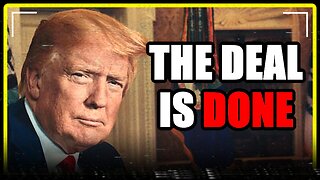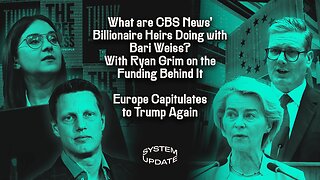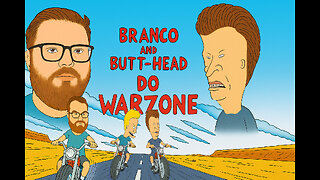Premium Only Content

Australian senator, Malcolm Roberts
"The plan of the Great Reset is that you will die with nothing."
Australian senator, Malcolm Roberts, dropping serious truth bombs about Klaus Schwab's World Economic Forum—and its dystopian Great Reset agenda—in the Australian parliament.
"Klaus Schwab's 'life by subscription' is really serfdom. It's slavery. Billionaire, globalist corporations will own everything—homes, factories, farms, cars, furniture—and everyday citizens will rent what they need, if their social credit score allows."
For more content like this, visit: https://wide-awake-media.com
Malcolm Roberts was an Australian politician who served as a senator for Queensland. Born on May 3, 1955, Roberts is a member of the One Nation party, a right-wing populist and nationalist political party in Australia.
Before entering politics, Malcolm Roberts had a background in business and was known for his involvement in issues related to climate change skepticism. He gained attention for his views on climate science and his association with various organizations that question the mainstream scientific consensus on climate change.
Roberts first entered the Australian Senate in 2016 but faced a controversy related to his dual citizenship, which led to him being disqualified. However, he returned to the Senate in 2019 after winning a special recount following the resignation of another senator.
Klaus Schwab is a German economist and engineer, best known as the founder and executive chairman of the World Economic Forum (WEF). The World Economic Forum is a Swiss-based non-profit organization that was established in 1971. Its annual meeting in Davos, Switzerland, is particularly well-known, attracting political leaders, business executives, academics, and other prominent figures from around the world.
Key points about Klaus Schwab and the World Economic Forum (WEF) include:
Founder of WEF:
Klaus Schwab founded the World Economic Forum in 1971 as a platform for business and political leaders to discuss and collaborate on global economic issues.
Mission:
The WEF's mission is to improve the state of the world by engaging business, political, academic, and other leaders of society to shape global, regional, and industry agendas.
Annual Meeting in Davos:
The annual meeting in Davos is a flagship event where leaders gather to discuss and address pressing global challenges.
Topics discussed at Davos cover a wide range of issues, including economics, politics, technology, and social concerns.
Global Initiatives:
The WEF is involved in various global initiatives and projects, often collaborating with governments, businesses, and non-governmental organizations.
It focuses on issues such as climate change, economic inequality, digital transformation, and other challenges facing the world.
Public-Private Cooperation:
The WEF promotes public-private cooperation as a means to address global challenges, emphasizing the need for collaboration between governments, businesses, and civil society.
Fourth Industrial Revolution:
Klaus Schwab introduced the concept of the Fourth Industrial Revolution, highlighting the impact of emerging technologies such as artificial intelligence, robotics, and the internet of things on society, economy, and governance.
It's important to note that the World Economic Forum and Klaus Schwab have faced both praise and criticism. Supporters view it as a valuable platform for global cooperation, while critics sometimes express concerns about the influence of powerful elites and the perceived lack of democratic accountability in shaping global policies.
-
 0:52
0:52
420 VGT LIVE 5.0
1 year ago🔥🚨DEVELOPING: John McAfee’s web security
2.01K2 -
 LIVE
LIVE
SpartakusLIVE
1 hour agoThe Return of the KING of Content
429 watching -
 10:05
10:05
MattMorseTV
5 hours ago $0.85 earnedHe actually did it...
4.59K9 -
 1:17:18
1:17:18
Glenn Greenwald
1 day agoWhat are CBS News' Billionaire Heirs Doing with Bari Weiss? With Ryan Grim on the Funding Behind It; Europe Capitulates to Trump Again | SYSTEM UPDATE #494
68.4K29 -
 LIVE
LIVE
megimu32
1 hour agoOTS: Movie Tie-In Games + Remakes: Let’s Play Memory Lane
66 watching -
 1:43:49
1:43:49
RiftTV
3 hours agoCNN Calls Black NY Shooter WHITE, Cincinnati FATIGUE | The Rift | Guest: Braeden Sorbo, 2Protects1
11.8K9 -
 LIVE
LIVE
LumpyPotatoX2
4 hours agoKilling Floor 3: Rampage & Chaos - #RumbleGaming
55 watching -
 LIVE
LIVE
BrancoFXDC
4 hours agoPlaying Ranked Warzone - Pursuit of Diamond Rank
81 watching -
 1:11:41
1:11:41
Omar Elattar
4 hours agoThe Brain Experts: "Your Overthinking Problem Has A Physical Solution & We Can Show You!"
771 -
 LIVE
LIVE
Mattnifico
3 hours agoREPLAYING EVERY FORZA HORIZON GAME - Forza Horizon 1 (Part 2)
25 watching